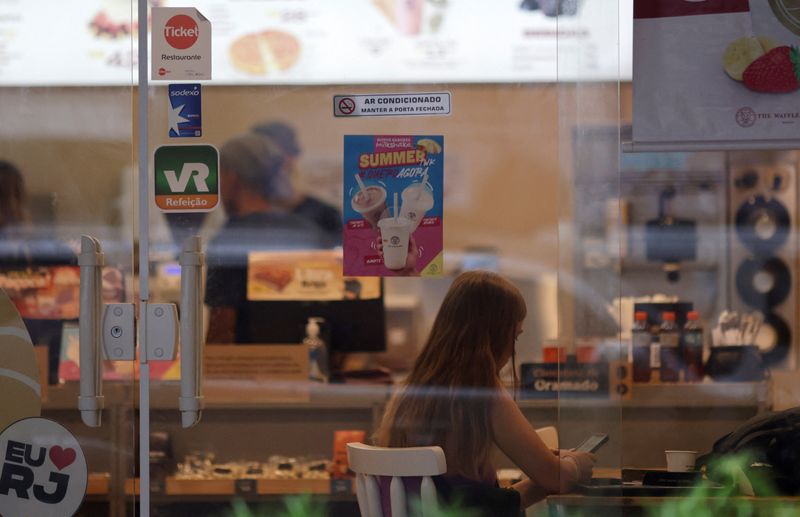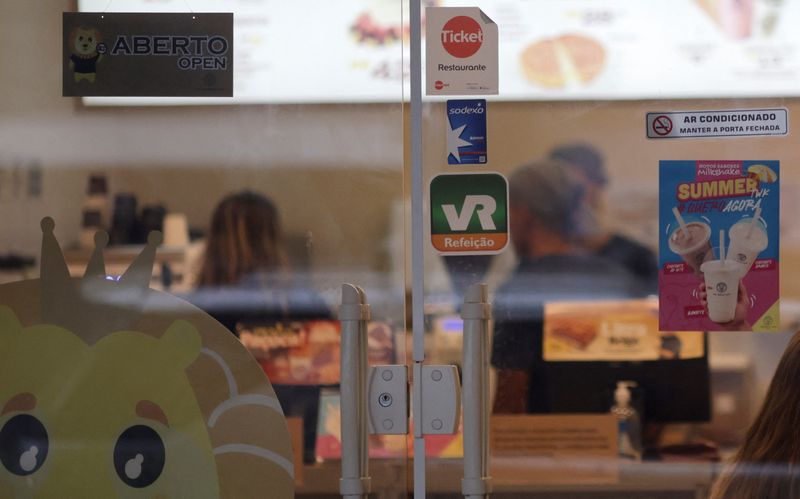By Marcela Ayres
BRASILIA (Reuters) -Fresh competition in Brazil's lucrative meal voucher market must wait, according to people familiar with discussions between the Finance Ministry and central bank, which disagree about how to regulate a new system in time for its scheduled launch in May.
A law passed in September under former President Jair Bolsonaro allows workers to move their meal credit between providers and spend it at any participating restaurant. But under new President Luiz Inacio Lula da Silva, government efforts to regulate such a "portable" and "interoperable" system have stalled. Tech companies including the financial services arm of Mercado Libre and meal delivery company iFood expect the rules to let them take a bigger bite of a nearly 150 billion reais ($29 billion) market dominated by a handful of companies. More competitive options for tens of millions of Brazilians spending their employer-provided meal vouchers may dent profit margins for Sodexo (EPA:EXHO) and Edenred (EPA:EDEN) subsidiary Ticket. Sodexo got 26% of its operating revenue from Brazil last year and Edenred got 22%, according to investor presentations. The Finance Ministry says the central bank has jurisdiction to regulate payment systems, but sources said the central bank resisted early proposals to shake up the market and sought to keep its hands off the segment.
The bank's staff believes the voucher market presents no systemic risk. The bank has also said transferring voucher credits could actually hurt competition, creating new barriers to entry by requiring substantial investments in operations, according to two people familiar with the discussions.
A third source said the central bank has flagged a lack of personnel and resources for the new regulatory task, after a strike disrupted the institution last year, delaying economic data releases and high-priority projects. The standoff has added to already high tensions between the Finance Ministry and central bank, the sources said on condition of anonymity. The two institutions have also traded barbs over fiscal and monetary policy.
The central bank declined to comment on its reported resistance to regulating the market. The Finance Ministry did not respond to questions about the matter.
TAX INCENTIVES
Since 1976, Brazilian companies have received tax benefits for covering the cost of their workers' food. The result is a widespread meal voucher system dominated by Sodexo and Edenred, along with privately held rivals Alelo and VR, all of whom also manage other employee benefits.
In 2021, Bolsonaro sought to open the market with a decree reducing incumbent advantages. Congress backed his proposal with a law in September, and the Labor Ministry set up a task force in December to issue regulations.
But Lula's Labor Ministry disbanded that task force after he took office in January. The ministry told Reuters such regulation "goes beyond its competencies," and should be handled by the Finance Ministry and the central bank.
iFood's Director of Public Policies Joao Sabino said the lack of public hearings or government action is "worrying." The portability of voucher credits, which should begin in May under the law, requires extensive regulations to set up a clearing house. He said that timeline now seems unrealistic.
"This market opening will only work if portability is established," said Fernanda Laranja, senior manager of public policy at Mercado Pago, a unit of Mercado Libre. "Otherwise ... the companies that hold 85% to 90% of the market will continue to be in power."
Those incumbent advantages allow major players to charge around 7% in interchange fees for restaurants accepting their meal cards, compared to an average 2% for credit cards and less than 1% for debit cards.
Sodexo, Edenred, Alelo and VR declined to comment, referring questions to the Brazilian Association of Worker Benefits Companies (ABBT).
ABBT President Alaor Aguirre said it was "completely unfeasible and impossible" for the sector to meet deadlines established in the 2022 law.

He said ABTT supports a single "interoperable" network for all accredited players, but the necessary technological integration has not yet started.
Aguirre said the push for a portable system letting workers move their credit between providers would be a "big mistake," hiking costs and inviting new entrants with no concern for nutritional quality or expanding the network of accredited restaurants.
